A flexible solar panel makes it easy to take solar power with you wherever you go.
Some of these panels can be rolled up like a poster and brought along if you’re heading to the beach, camping, boating, or RVing. Others are not quite so flexible, but more on that later.
These panels can be the perfect portable solar power solution to recharge your gadgets or keep your solar battery or power station topped up.
While camping, just unroll your panel in a sunny spot, throw it over your tent, or attach it to your backpack to keep your cell phone or laptop charged and ready to go.
If you’re boating you can unroll a flexible panel on the deck or attach it to your sail to keep your marine battery charged. The panels can be fastened by their corner grommets, or secured with adhesive, double-faced tape, or Velcro strips.
Bendable panels do have some drawbacks compared to traditional solar panels but they also have some great advantages.
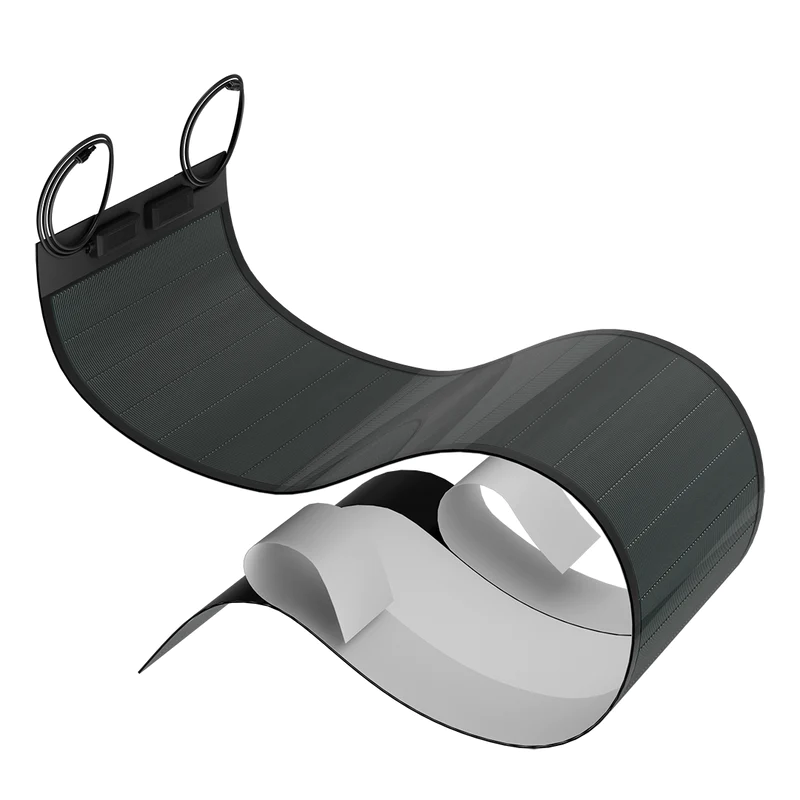
Advantages of Roll Up Solar Panels
A flexible solar panel can do things that a standard panel can’t. Let’s take a look at a few of the advantages that these portable solar panels have over their rigid counterparts:
- Portable
- Traditional solar panels are an incredible invention and a great source of power but they’re not very portable. They are rigid and bulky due to their solid covering and rigid frame. Roll up solar panels stay portable by using a flexible protective coating over ultra-thin silicon wafer solar cells or thin-film technologies like amorphous silicon or CIGS.
- Lightweight
- Using a protective polymer known as ETFE instead of an aluminum frame and glass makes a roll up portable solar panel much lighter than a traditional panel. For instance, a 110 watt rigid panel from Nature Power weighs over 18 pounds while a flexible 110 Watt solar panel from Sunpower weighs under 5 pounds.
- Cheaper Options
- Due to the lack of materials like aluminum and glass, you can find flexible panel options that are less expensive than standard solar panels. Many premium roll up solar panels are actually more expensive, however, so shop carefully. If you’re buying a cheaper panel, buy from an established company that is likely to still be around if you have to make a warranty claim.
- Easy to Install
- Roll up panels can be installed in a variety of ways. Many have grommets that can be secured with zip ties or carabiner clips. You can also use magnets if the panels are being attached to a vehicle or other metallic surface. Velcro and adhesive are also good options. Some flexible panels are ‘peel and stick’ with adhesive strips included on the back of the panel. The important thing is that you will not require a racking system or roof punctures as you would with rigid panels.
Now that we’ve looked at some of the advantages of flexible solar panels, it’s time to consider some of the weak points of these panels.
Disadvantages of Roll Up Solar Panels
A flexible panel works in certain situations that a regular solar panel doesn’t. Unfortunately these panels also have the following drawbacks:
- Less Efficient
- When we say that flexible panels are less efficient than rigid solar panels, it applies to certain types of these panels. Technologies like amorphous silicon and CIGS are less efficient than traditional crystalline solar technology. The flexible panels from companies like Sunpower, however, feature high-efficiency monocrystalline solar cells with over 23% efficiency.
- Less Durable
- One of the great things about rigid solar panels is that they last for a long time. Most of these traditional panels come with a 25 year warranty so you can rest easy for the next quarter of a century! Flexible solar panels are much less durable, however, and do not last nearly as long. Most of these panels have warranties of one to five years. Since these panels sit in the sun, one of the problems you might encounter is delamination and UV degradation. Another issue is microcracks. These are tiny fractures in the solar cells that reduce the energy output of the panel. Short lifespan is the biggest downside to these panels. Factor this into your decision before deciding to go with a flexible solar solution!
Types of Flexible Solar Panels
There are two main types of flexible panel and they have some significant differences. Your two options when shopping for a bendable solar are:
Crystalline Flexible Solar Panels
- These panels use the monocrystalline or polycrystalline solar cells that you find in most rigid solar panels. The only difference is that the crystalline cells used in these panels are much thinner than the standard version. The downside to these solar cells is that they are quite fragile. This isn’t a big deal in a rigid panel where the cells are protected by glass and an aluminum frame. When used in a flexible panel, however, the solar cells are quite easily damaged. This is why these panels are actually more ‘semi-flexible’ than truly ‘flexible’. It is also why the warranty period on these panels is only one to five years.
Thin-Film Flexible Solar Panels
- Instead of using crystalline solar cells, these panels use a thin-film photovoltaic material. These thin-film solar panel technologies include copper indium gallium diselenide (CIGS), cadmium telluride (CdTe), and amorphous silicon (a-Si). The advantage to thin film flexible panels is that they are more durable than the ones made with crystalline solar cells. These panels are also much more flexible. Many of them can be rolled up like a yoga mat as they have true 360 degree flexibility.
Flexible Solar Panel Options
Here are a few of the solar companies that you should take a look at when considering a flexible panel:
Renogy
- This company began in 2010 as a small project by students at Louisiana State University. The aim of the company is to provide what you need to build off-grid solar power systems at affordable prices. Renogy’s flexible panel options are made with monocrystalline solar cells and the power output of their panels ranges from 50W to 200W. The great thing about this company is that they offer a 5 year material and workmanship warranty (this is one of the highest warranties in the flexible panel category).
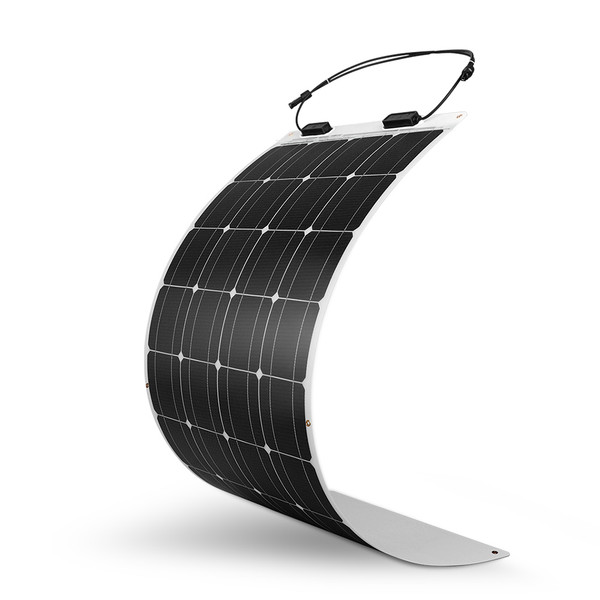
SunPower
- SunPower has been around for over 35 years and is known for their high quality (and high efficiency) panels. Their monocrystalline solar cells are the only cell built on a solid copper foundation. This is said to make their panels more resistant to power loss through cracking and corrosion. The company backs up this claim with a five year warranty. Their materials allow for panel flexing of up to 30 degrees.
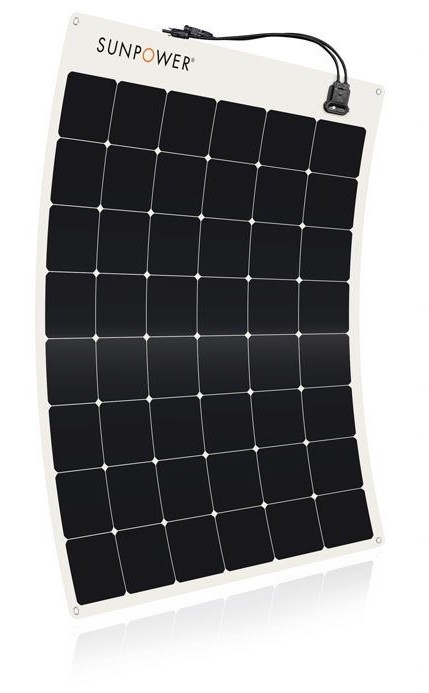
BougeRV
- Part of this company’s mission is to provide a better outdoor life experience to all RV and off-grid travelers. BougeRV’s flexible solar panels are different from the panels made by Renogy and SunPower as they are not made with crystalline solar cells. BougeRV actually uses a thin film solar technology called CIGS (Copper Indium Gallium Selenide). This technology is more flexible than traditional solar cells and allows BougeRV panels to achieve true 360-degree bendability. This means you can actually roll these panels up like a yoga mat. CIGS is also more light-sensitive and will gather more energy while partly shaded or in low-light conditions. BougeRV flexible panels are available in 100W and 200W options.

Rich Solar
- This company has been around since 2005 and their mission is to make renewable energy easy. Rich Solar does have a flexible 100W monocrystalline panel, but they are better known for their 80W and 160W CIGS flexible panels. We mentioned the durability and low-light advantages of CIGS panels above, so these are definitely worth your consideration.
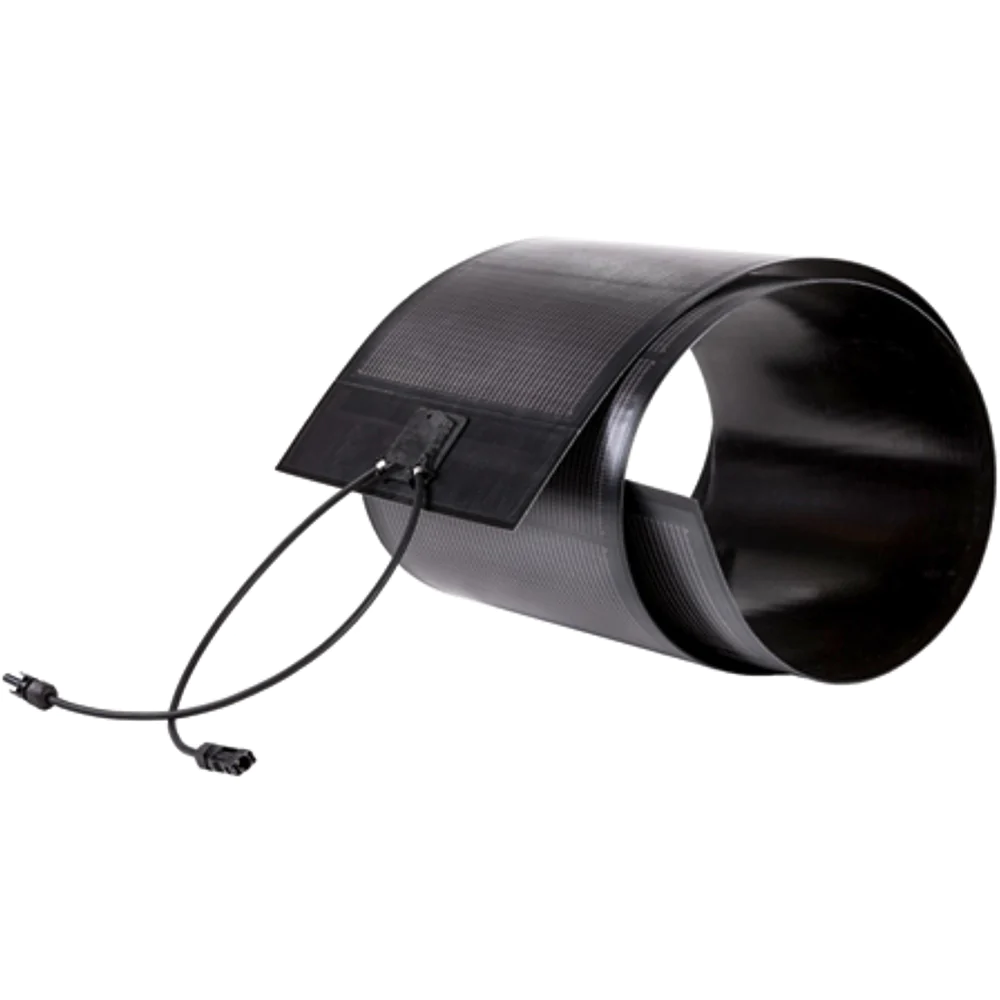
PowerFilm Solar
- This company has stood the test of time and has been around for 30 years. PowerFilm’s offerings top out at 60 watts, so they could be a good option if you’re looking for small flexible solar panels. We’ve included the company as they are one of the few options if you are looking for panels made with amorphous silicon. This is another thin-film solar technology that is very durable and performs well in partial light. The company also has a full lineup of foldable solar panels.
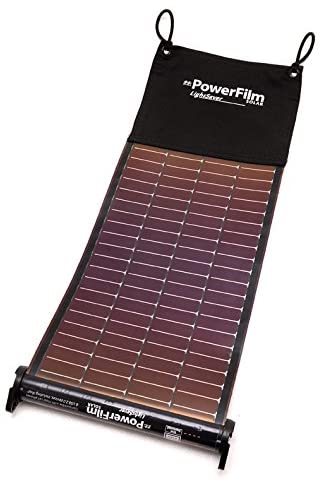
The Future of Flexible Solar
Even though there are many great flexible solar options available now, there is an even more promising possibility on the horizon.
Organic solar cells (OSCs) have long been considered a promising next-generation solar technology, but unfortunately the process used to create these cells has been difficult to scale.
Recently, however, it seems that these technical difficulties have been overcome by researchers at the Gwangju Institute of Science and Technology in South Korea. This could make it easier to manufacture organic solar cells and develop ‘printing technology for large-area solar cell technology‘.
This could lead to solar panels that are lightweight, flexible, semitransparent, and capable of customized color and shape. On top of all this, they will be durable and cheap to make!
We likely have a ways to go before these organic cells are ready for action, but this represents another exciting possibility for the future of solar power and the flexible solar panel.
Frequently Asked Questions
How bendable is a flexible solar panel?
- The flexibility of these panels varies greatly. The flexible panels that are built with crystalline solar cells should really be considered more ‘semi-flexible’ than ‘flexible’. For instance, SunPower says that their panels are ‘flexible up to 30 degrees’. Panels using thin-film technology are much more flexible. For instance, the CIGS panel of BougeRV ‘achieves truly 360-degree bendability’. This means you can roll these panels up and put them in a travel bag. Make sure you find a panel that fits your flexibility needs.
Can you walk on flexible solar panels?
- No, walking on solar panels is not recommended. It can cause solar cell damage and in many cases it will void your warranty. If you still want a durable panel, consider amorphous silicon and CIGS options over the more brittle solar cells used in crystalline panels.
